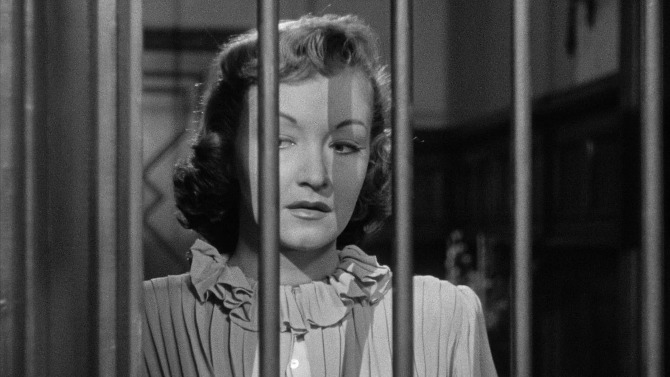
What’s the Name of the Game
There are so many things that go into making us who we are as individuals – from our parents and our past experiences, to our job and where we live, with even something as simple as our name becoming a big part of forming our identity as a human being... but, if those things are taken away from us, how might someone prove who they are when there is no evidence of what is being claimed. Infusing post-war themes within a kidnapping/murder mystery melodrama with film noir motifs, My Name is Julia Ross (1945), directed by Joseph H. Lewis (Gun Crazy) and based upon the novel “The Woman in Red” by Anthony Gilbert (the pen name of Lucy Beatrice), entraps us in the strange predicament of the titular character... though no one is calling her by that name. Following Julia Ross (Nina Foch) in post World War II London, England, she is in a rather difficult predicament – as she falls behind on her rent, she can find no work no matter how hard she looks.
-
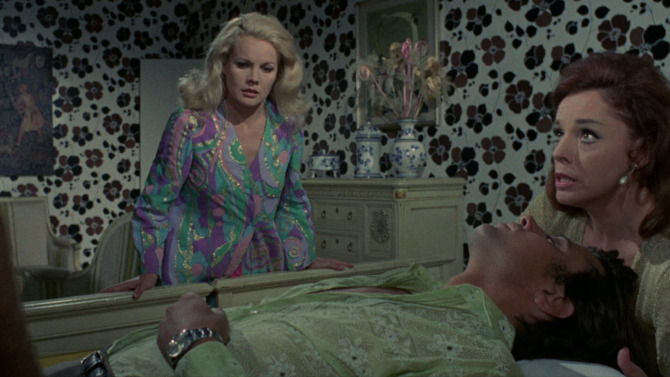
Villa Killa
A Quiet Place to KillDecember 8, 2020Giallo fun fact of the day: did you know that by shooting pigeons, you will help quash your primordial animalistic desire to kill? Well, this bizarre fact will most definitely be put to the test in the very film it is found within. . . 1970's A Quiet Place to Kill, directed by Umberto Lenzi and starring Carroll Baker – their third of four collaborations together. Try to follow me here, this film can often be mistaken for another, as A Quiet Place to Kill was titled Paranoia in its native Italy (a co-production between the boot, Spain, and France) – which just so happens to be the same title (at least in the United States) as Lenzi and Baker’s 1969 effort, Orgazmo (you can probably guess why American distributors chose to rename it. . . also, don’t confuse this with the 90s American sex comedy). And, just to be different, in Spain, they decided to call it A Drug Named Helen. . . talk about playing the name game. And, just to further complicate the primary title, Lenzi directed a picture the next year – called An Ideal Place to Kill. . . it seems like Lenzi was making so many gialli that he was running out of titles for them.
-
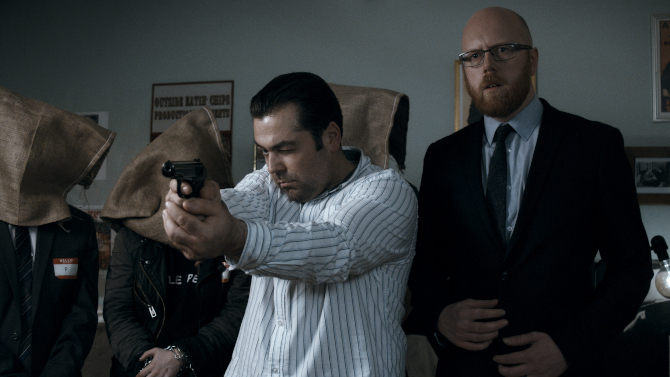
Criminal Minefield
Criminal AuditionNovember 8, 2020Another intriguing indie coming out of the U.K., 2019's Criminal Audition, co-written and directed by Samuel Gridley, is a highly original, uniquely twisted mystery drama with a subtle undercurrent of dark humour running just below the surface – something the British are so bloody good at. A little like an intricately written stage play, Gridley drops us into a most claustrophobic setting. . . first introducing us to a dilapidated, soon to be flattened old theatre during the hyper-stylized opening credits, this soundproof tomb is the location chosen by twitchy, highly stressed criminal mastermind, William (Rich Keeble). Though he’s the boss pulling the strings, our eyes are those of Ryan (Luke Kaile – the other co-writer of the script), a much younger grunt worker who knows William and his operation all too well.
-
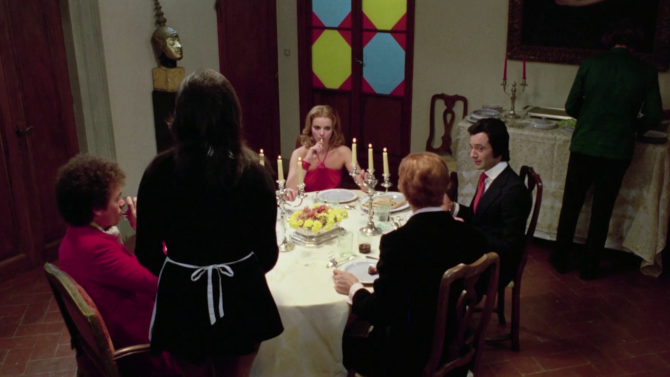
Parisi Place
The Police Are Blundering in the DarkOctober 8, 2020And suddenly, a new contender arises. . . and by that I mean for all-time great giallo titles. Evoking the very essence of the Italian genre, 1975's The Police Are Blundering in the Dark, directed by one-and-done film maker Helia Colombo, may not have the sheer audacity of a title along the lines of Your Vice is a Locked Room and Only I Have the Key, or the more macabre imagination of Death Walks on High Heels, but it is murder mystery cool personified. With the police only arriving for the final few minutes of the film (making it all a bit misleading). . . the title is actually in reference to a newspaper headline highlighting the incompetence of the fuzz in rural Italy. With four nude models having recently been murdered (by way of scissors or some other sharp instrument) – oh, the humanity!!! – all roads somehow lead to the Parisi estate.
-
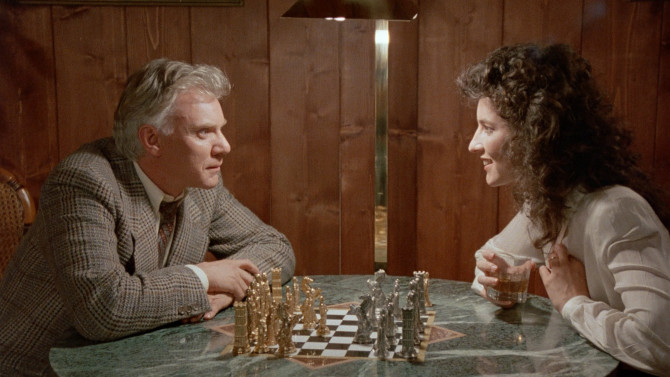
Game Point
The CallerSeptember 30, 2020With a title like The Caller (1987), one would perhaps have a preconceived notion that the Michael Sloan written (the co-creator of the television series The Equalizer), Arthur Allan Seidelman directed film would be something along the lines of the much more popular When a Stranger Calls (1979, or, if you prefer, the 2006 remake), yet, like its misleading title, nothing is what it seems. A cerebral horror tinged mystery thriller (that may just have an unexpected dose of sci-fi), Seidelman, who would seem to be aptly named, immerses the viewer with a quarter of an hour of what amounts to a chilling silent game of stalker cat versus female mouse. Taking us from an eerily quiet town to the even more isolated rural woods, our protagonist, simply known as The Girl – reminiscent of the basic names characters were given in the silent film era (Madolyn Smith Osborne), lives in a home that, in lesser hands, would likely resemble the cabin found in the Evil Dead franchise.
-
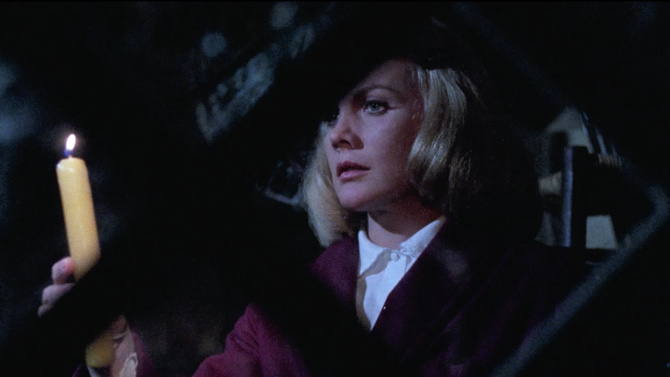
Silent Knife, Deadly Knife
Knife of IceSeptember 10, 2020A giallo that mostly forgoes the prototypical violent splatters and liberal amounts of nudity for a good old fashioned Agatha Christie style murder mystery, 1972's Knife of Ice, also sometimes known as Dagger of Ice and The Ice Pick (memo: ice does not play any part in this motion picture), is the fourth and final time Italian film maker Umberto Lenzi (Seven Blood-Stained Orchids) and American actress Carroll Baker (Baby Doll; The Game) would work together. Baker stars as Martha Caldwell, a woman who has been mute since she was thirteen (it all stems from the fact she was rescued by her parents during a horrid train crash, only to then witness them burn to death – in many ways, the occurrence has stunted her at that very age). Opening with a fantastic sequence in which she attempts to conquer her fears by waiting at the train station for her incoming cousin, Jenny Ascot (Evelyn Stewart – The Psychic), it very much sets the mood – a tense, classical style intro (somewhat reminiscent of the many works of Hitchcock) that makes us feel for our struggling main character.
-
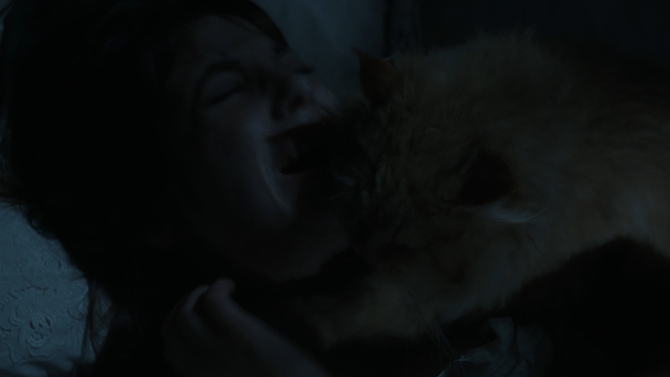
Cat Me If You Can
Seven Dead in the Cat's EyeAugust 11, 2020Expect some lowlifes in the highlands – after all, don’t they say, ‘expect less rather than moor, and you won’t be disappointed’; also, look for some individuals who put the clan in clandestine. Another warning, when dealing with crypts, loch it up and throw away the key. . . okay, enough with all of this wacky wordplay and welcome to one of those intriguing gialli that uproots from their native Italy to a foreign destination (if you haven’t yet guessed Scotland, my kilty pleasure of quirky puns was for naught); namely, Seven Deaths in the Cat’s Eye (1973). Directed by Antonio Margheriti (though you will see his English name, Anthony M. Dawson, in the credits), we are transported into the gothic world of the Scottish countryside alongside Corringa (Jane Birkin), a young woman that is part of the ancient family of MacGrieff – though MacGuffin might be a better name with all of the trickery found in the plot. Making the trip to her clan’s ancestral home (actually a gothic castle named Dragonstone), what she doesn’t know is that a murder has been committed in the cavernous basement of the abode (a location that would make Bruce Wayne jealous).
